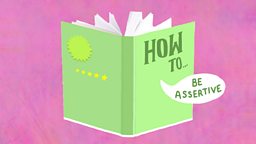How to be more assertive
Are you good at standing up for yourself? Do you assert your own needs and make yourself heard? Or are you afraid of being seen as angry or rude and put other people’s needs in front of your own?
As part of our How To series looking at some of life’s big challenges, Woman’s Hour spoke to three women to explore how to become more assertive.
Here are seven useful tips from our guests: Rebecca Reid, journalist and author of the Power of Rude; Kelechi Okafor, actor, podcaster and writer; and Sam Baker, the former editor of Cosmopolitan and Red and the author of The Shift.

Stop worrying about being perceived as rude
Rebecca Reid’s realisation that she wanted to be more assertive came when she was on Good Morning Britain about 18 months ago.
“I was on with a male comedian who was quite robust and he wouldn't stop talking. The question was even asked to me and he really, really wouldn't stop talking. And I sort of leant forward and I shushed him, like you do to a child. Put my finger in front of my lips and went ‘shush!’ It was very, very briefly a sort of national news story. One newspaper dubbed me ‘Rebecca Rude’.
"I was really upset about it because I have nice manners. I always say ‘please’ and ‘thank you’. But then I sort of reflected on it and I thought, well, actually, if everyone's going to think that I'm rude, maybe I'll give it a go.
“I was amazed by how quickly my life just started to be easier and better when I stopped worrying about being perceived as rude, assumed I would be perceived as rude, and then did what felt right rather than what felt polite.”
Think about the words you use
To be assertive, we need to think about the language we use, according to Kelechi Okafor and Rebecca.
“Take the word ‘just’ out of your correspondence. It is something women use a lot to minimise the space they take up,” advises Kelechi.
Rebecca thinks that we should avoid using qualifiers in our speech like, ‘I was just wondering’ or ‘so sorry to ask’. “If your request is worth asking, it doesn’t need to be softened.”
She also thinks that we should stop feeling obliged to explain. “‘No thank you’ is a complete sentence, and very rarely does it require any further explanation.”
When you get interrupted, in work or in your personal life, Rebecca’s approach is simple: “Try smiling but saying ‘if I could just finish’. You’ll be shocked by how effective it is.”
Realise that not everyone can like you all the time
“I wasted a lot of time trying to keep everyone happy,” says Sam Baker. “Until I was 50...I did all of those things all of the time right down to if someone would say, ‘what meal do you want tonight? Do you want Indian or Chinese?’ I would say, ‘Oh, whatever you like’, instead of, 'actually, I really want Indian'.
“Not only does this result in nobody being happy, including you, it leads to a terrible lack of clarity.
“Life is too short to spend it biting your tongue, being talked over and doing things you don’t want to do. Think of that time you’ll never get back, and speak up.”

Stop tolerating small but pointless inconveniences
Do you put up with annoying things to avoid confrontation or because you’re scared to be seen as rude? If so, you need a new approach, argues Rebecca.
“If the water is too cold during a wash at the hairdressers, ask for it to be warmer. If someone gets your coffee order wrong, don’t just drink it. These small actions add up.
“It’s about doing things that you might internally fear are going to be perceived as rude, even though very often they're not objectively rude and doing it because it's what you need or what you want.”
Truly believe you are worthy of the space you intend to take up
Kelechi’s upbringing has had a big impact on her drive for more self-worth and to be more assertive.
“I’ve definitely had to learn how to become more assertive as someone who was a victim of sexual abuse when I was a child. I didn't speak up for myself. I kind of went inwards and kind of closed myself off from the world as a way of protecting myself. But actually, what I realised is that that silence wasn't protecting me. In fact, it just meant that everything was kind of ruminating on the inside. And there was a lot of anger there as well.
“It took me maybe until I was about 21 to get to that point where I thought to myself, actually it feels so horrible to exist inside me. And in that moment there was the ‘well, who was the me who is existing inside of this body?’ That me deserves a chance to speak up and to speak out and to live as joyfully and as loudly as possible.
“So I started to go to therapy. I started learning vocabulary for the ways in which I'd been violated in a number of instances. And from having the vocabulary, I then found the power to speak up for myself and to also encourage other people to speak out.”
Trust your own judgement
“As young girls we learn to put other people’s opinions or wants before our own. Stop it!” says Sam Baker.
Rebecca agrees: “I was a nanny for many years. So I spent a lot of time sort of seeing how people raised their children. One thing that I really noticed is how differently we treat little girls and little boys. The difference in how often little girls are told to say ‘please’, say ‘thank you’, to sit up straight. Whereas little boys are kind of ‘oh, they're so energetic’, letting them run around, ‘boys will be boys’.
“I think probably now parents are less likely to do those things. But it's still there. There still is that sense that girls have got to put other people's comfort above their own.”
Mimic those who you respect
A final quick tip from Rebecca: “Make a list of the people you respect most in your working or personal life, then assess how they ask for things and give instructions. Try to mimic them.”
Listen to the full discussion on 主播大秀 Sounds where you can also find episodes of Woman’s Hour you may have missed.
Follow us @bbcwomanshour on and .




